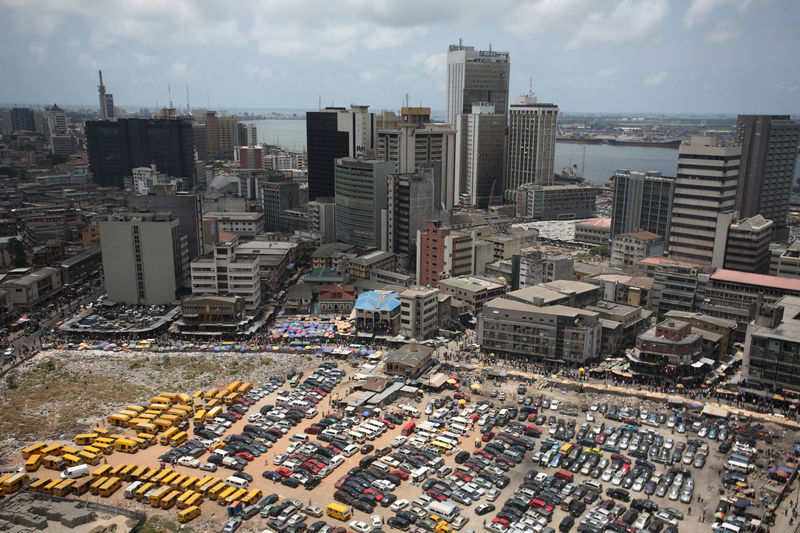(Adds details, protester quote)
By Abraham Achirga and Afolabi Sotunde
ABUJA, July 23 (Reuters) - Nigerian troops and police
clashed on Tuesday with Shi'ite Muslim protesters in the capital
Abuja and gunfire could be heard, according to a Reuters
witness.
The air was thick with teargas as soldiers and police
officers made arrests. The Shi'ite group marched in protest
against the continued detention of its leader, despite a court
ruling that he be released.
The violence happened a day after at least three people -
including a journalist and senior policeman - were killed in a
similar confrontation in the administrative heart of Abuja. As
many as 10 more people may have died in the violence, a
spokesman for the Shi'ites said that day. A Reuters reporter witnessed the funeral in Nigeria's
northern state of Niger for six of those the group said were
killed during Monday's protest. A man whose child was killed
during the protest said his son has become a martyr.
"The only thing that will stop this protest is for the
government to ... free our leader Sheikh Ibrahim Zakzaky," said
Abdullahi Musa.
"We are not armed. If we were armed, these people cannot
face us. It's because they see we are unarmed that is why they
are killing us, shooting us and this will never deter us from
what we are doing," he said.
President Muhammadu Buhari, a Sunni like the vast majority
of Nigeria's Muslim community, warned in a statement before
Tuesday's protest: "Let nobody or group doubt or test our will
to act in the higher interest of the majority of our citizens."
"Perpetrators of the mayhem will not go unpunished (and) no
government can tolerate unceasing affront to constituted
authority," he added.
Islamic Movement of Nigeria (IMN) members regularly take to
the streets of Abuja to call for the release of Zakzaky, who has
been in detention since 2015. They say Zakzaky requires medical
help. Live ammunition and teargas have been used by security
forces in recent weeks. Clashes between police and Zakzaky's backers have raised
fears that the IMN might turn to violent insurgency as did Sunni
Islamist group Boko Haram after police killed their leader in
2009.
- English (USA)
- English (UK)
- English (India)
- English (Canada)
- English (Australia)
- English (South Africa)
- English (Philippines)
- Deutsch
- Español (España)
- Español (México)
- Français
- Italiano
- Nederlands
- Português (Portugal)
- Polski
- Português (Brasil)
- Русский
- Türkçe
- العربية
- Ελληνικά
- Svenska
- Suomi
- עברית
- 日本語
- 한국어
- 简体中文
- 繁體中文
- Bahasa Indonesia
- Bahasa Melayu
- ไทย
- Tiếng Việt
- हिंदी
UPDATE 3-Shi'ite protesters clash with Nigeria military, police in Abuja
Published 23/07/2019, 23:29
UPDATE 3-Shi'ite protesters clash with Nigeria military, police in Abuja

Latest comments
Install Our App
Risk Disclosure: Trading in financial instruments and/or cryptocurrencies involves high risks including the risk of losing some, or all, of your investment amount, and may not be suitable for all investors. Prices of cryptocurrencies are extremely volatile and may be affected by external factors such as financial, regulatory or political events. Trading on margin increases the financial risks.
Before deciding to trade in financial instrument or cryptocurrencies you should be fully informed of the risks and costs associated with trading the financial markets, carefully consider your investment objectives, level of experience, and risk appetite, and seek professional advice where needed.
Fusion Media would like to remind you that the data contained in this website is not necessarily real-time nor accurate. The data and prices on the website are not necessarily provided by any market or exchange, but may be provided by market makers, and so prices may not be accurate and may differ from the actual price at any given market, meaning prices are indicative and not appropriate for trading purposes. Fusion Media and any provider of the data contained in this website will not accept liability for any loss or damage as a result of your trading, or your reliance on the information contained within this website.
It is prohibited to use, store, reproduce, display, modify, transmit or distribute the data contained in this website without the explicit prior written permission of Fusion Media and/or the data provider. All intellectual property rights are reserved by the providers and/or the exchange providing the data contained in this website.
Fusion Media may be compensated by the advertisers that appear on the website, based on your interaction with the advertisements or advertisers
Before deciding to trade in financial instrument or cryptocurrencies you should be fully informed of the risks and costs associated with trading the financial markets, carefully consider your investment objectives, level of experience, and risk appetite, and seek professional advice where needed.
Fusion Media would like to remind you that the data contained in this website is not necessarily real-time nor accurate. The data and prices on the website are not necessarily provided by any market or exchange, but may be provided by market makers, and so prices may not be accurate and may differ from the actual price at any given market, meaning prices are indicative and not appropriate for trading purposes. Fusion Media and any provider of the data contained in this website will not accept liability for any loss or damage as a result of your trading, or your reliance on the information contained within this website.
It is prohibited to use, store, reproduce, display, modify, transmit or distribute the data contained in this website without the explicit prior written permission of Fusion Media and/or the data provider. All intellectual property rights are reserved by the providers and/or the exchange providing the data contained in this website.
Fusion Media may be compensated by the advertisers that appear on the website, based on your interaction with the advertisements or advertisers
© 2007-2025 - Fusion Media Limited. All Rights Reserved.